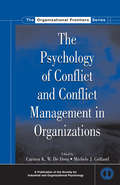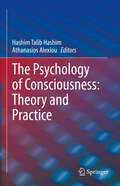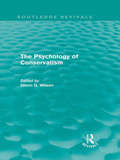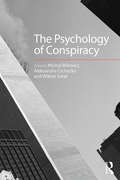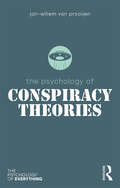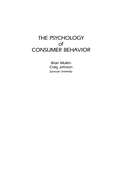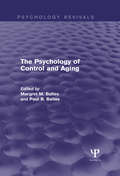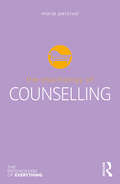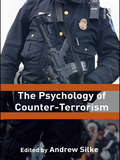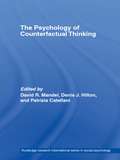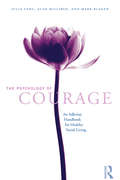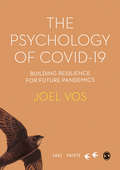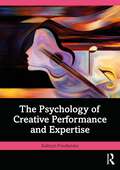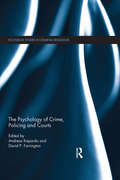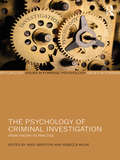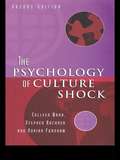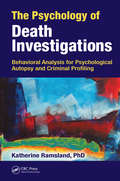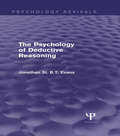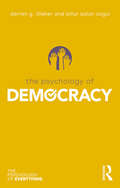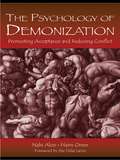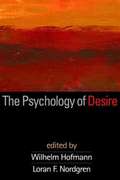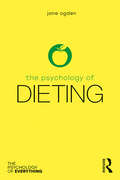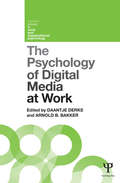- Table View
- List View
The Psychology of Conflict and Conflict Management in Organizations (Siop Organizational Frontiers Ser.)
by Michele J. Gelfand Carsten K. W. De DreuThis volume in SIOP's Organizational Frontiers Series is a state-of-the-art overview of contemporary conflict research which aims to place conflict research and theory squarely within the realm of industrial and organizational psychology. This volume brings together and integrates classic and contemporary insight in conflict origins, conflict
The Psychology of Consciousness: Theory and Practice
by Athanasios Alexiou Hashim Talib HashimThis book talks about the levels of consciousness and their roles in controlling our life and behaviour. The consciousness has a main role in learning human to behave and to live in all life’s situation and ages. This book clarifies these situations in details and the laws that make this system work properly. It provides many solutions and suggestions to control ourselves and our minds and put them in the right way. This book explains many of our behaviours depending on the psychology and the role of the consciousness in the psychiatry, how to treat diseases and mental disorders and how to improve the mental health as well. This subject is not well discussed and detailed in literature so there is a need to give this topic its role in the psychology and in scientific literature too. This book is targeting the consciousness’ levels and the role of these levels in our life and behaviours, so it divides the roles among them as appropriate and in the right way and then the humans can recognize which part is more important than the other and on what they should focus.
The Psychology of Conservatism (Routledge Revivals)
by Glenn WilsonFirst published in 1973, The Psychology of Conservatism explores attitudes, their measurement, their structure and dynamics, and the personality traits apparently underlying attitude patterns. It examines the link between differing attitudes and discusses characteristic patterns and syndromes. The book focuses on the origins and dynamics of a major factor called "liberalism – conservatism" which is found to account for much of the variance in attitudes amongst different people. Contributors review previous studies relating to personality and attitude before engaging in new studies and proposing their own theories to explain the conservative attitude. The book introduces provocative theoretical ideas and provides a valuable examination of an important psychological and social attitude syndrome. This book will be of interest to researchers in personality and social psychology, sociology and political science and education.
The Psychology of Conspiracy
by Aleksandra Cichocka Michal Bilewicz Wiktor SoralWhy did the third World Trade Center building (WTC7) collapse on September 11th , even though it was not struck by any aircraft? Why did Princess Diana’s "drunk" driver look sober as he climbed into the car minutes before their deadly accident? Could a slender birch tree really have caused the plane crash which killed the President of Poland in 2010? ‘Conspiracy thinking’ – the search for explanations of significant global events in clandestine plots, suppressed knowledge and the secret actions of elite groups – provides simple and logical answers to the social doubts and uncertainties that occur at times of major national and international crises. Contemporary social psychology seeks to explain the human motivation to create, share and receive conspiracy theories, and to shed light on the consequences of these theories for people’s social and political functioning. This important collection, written by leading researchers in the field, is the first to apply quantitative empirical findings to the subject of conspiracy theorizing. The first section of the book explores conspiracy theories in the context of group perception and intergroup relations, paying particular attention to anti-Semitic conspiracy stereotypes. It then goes on to examine the relationship between an individual’s political ideology and the degree to which they engage in ‘conspiracy thinking’. The concluding part of the book considers the explanatory power of conspiracy, focusing on the link between social paranoia and digital media, and highlighting the social, political, and environmental consequences of conspiracy theories. The Psychology of Conspiracy will be of great interest to academics and researchers in social and political psychology, and a valuable resource to those in the fields of social policy, anthropology, political science, and cultural studies.
The Psychology of Conspiracy Theories (The Psychology of Everything)
by Jan-Willem van ProoijenWho believes in conspiracy theories, and why are some people more susceptible to them than others? What are the consequences of such beliefs? Has a conspiracy theory ever turned out to be true? The Psychology of Conspiracy Theories debunks the myth that conspiracy theories are a modern phenomenon, exploring their broad social contexts, from politics to the workplace. The book explains why some people are more susceptible to these beliefs than others and how they are produced by recognizable and predictable psychological processes. Featuring examples such as the 9/11 terrorist attacks and climate change, The Psychology of Conspiracy Theories shows us that while such beliefs are not always irrational and are not a pathological trait, they can be harmful to individuals and society.
The Psychology of Consumer Behavior
by Craig Johnson Brian MullenAfter years of study in the area of consumer behavior, Mullen and Johnson bring together a broad survey of small answers to a big question: "Why do consumers do what they do?" This book provides an expansive, accessible presentation of current psychological theory and research as it illuminates fundamental issues regarding the psychology of consumer behavior. The authors hypothesize that an improved understanding of consumer behavior could be employed to more successfully influence consumers' use of products, goods, and services. At the same time, an improved understanding of consumer behavior might be used to serve as an advocate for consumers in their interactions in the marketplace.
The Psychology of Contemporary Art
by Gregory MinissaleWhile recent studies in neuroscience and psychology have shed light on our sensory and perceptual experiences of art, they have yet to explain how contemporary art downplays perceptual responses and, instead, encourages conceptual thought. 'The Psychology of Contemporary Art' brings together the most important developments in recent scientific research on visual perception and cognition and applies the results of empirical experiments to analyses of contemporary artworks not normally addressed by psychological studies. The author explains, in simple terms, how neuroaesthetics, embodiment, metaphor, conceptual blending, situated cognition and extended mind offer fresh perspectives on specific contemporary artworks - including those of Marina Abramović, Francis Alÿs, Martin Creed, Tracey Emin, Felix Gonzales-Torres, Marcus Harvey, Mona Hatoum, Thomas Hirschorn, Gabriel Orozco, Marc Quinn and Cindy Sherman. This book will appeal to psychologists, cognitive scientists, artists and art historians, as well as those interested in a deeper understanding of contemporary art.
The Psychology of Control and Aging (Psychology Revivals)
by Margret M. Baltes and Paul B. BaltesOriginally published in 1986, the central topic of this book is the analysis and application of control-related beliefs and behaviours for theory and practice in the psychology of aging. The volume was written for two specific interrelated purposes aimed at cross-fertilization between the psychology of control and the field of gerontology. The first purpose was to summarise available research and theory on the psychology of control for researchers and professionals interested in gerontology at the time. The second was to enrich the field of the psychology of control.
The Psychology of Counselling (The Psychology of Everything)
by Marie PercivalWhat is counselling and how can it help? Does counselling work? How is counselling different from talking to my family and friends about my problems? The Psychology of Counselling explains the different approaches to therapy and how they are used in practice, giving information on what counselling can help with and what it cannot do. It looks at cognitive and behavioural therapies, psychoanalysis, and humanistic psychology, as well as exploring positive psychotherapy and the move away from a disease-based approach to counselling. It also reflects upon the broader landscape of therapeutic spaces and gives consideration to professional issues in counselling, such as ethics, supervision, and duty of care to clients. At a time when mental health and psychological well-being are central subjects of conversation in modern society, The Psychology of Counselling sheds light on the therapeutic process, what it involves, and how it works, to help all those seeking assistance for relieving emotional or psychological issues and improving their psychological wellness.
The Psychology of Counter-Terrorism (Political Violence)
by Andrew SilkeThis edited book explores how psychology can be used to improve our understanding of terrorism and counterterrorism. This work firstly aims to provide balanced and objective insight into the psychology of terrorists; what their motivations are, what keeps them involved in terrorist groups, and what eventually forces most to end their active involvement in terrorism. Secondly, the contributors focus on the challenging issue of how to respond to terrorism. These chapters provide information for those concerned with short-term tactical problems (e.g. interviewing), as well as those looking towards the more long-term strategic questions of bringing an entire terrorist campaign to an end. Ultimately, the individuals involved in terrorism require a more complex response from society than simply a quest for their apprehension. Believing inaccurate and misleading characterizations leads inevitably to damaging policies and deficient outcomes and campaigns of violence are needlessly prolonged. It is from this perspective that the concern arises with how researchers – and the policy makers guided by them – perceive the psychology of terrorists and of terrorism. This innovative book will be of great interest to students of terrorism and counter-terrorism, security studies, psychology and politics, as well as security professionals and military colleges.
The Psychology of Counterfactual Thinking (Routledge Research International Series in Social Psychology)
by David R. Mandel Denis J. Hilton Patrizia CatellaniThis book provides a critical overview of significant developments in research and theory on counterfactual thinking that have emerged in recent years and spotlights exciting new directions for future research in this area. Key issues considered include the relations between counterfactual and casual reasoning, the functional bases of counterfactual thinking, the role of counterfactual thinking in the experience of emotion and the importance of counterfactual thinking in the context of crime and justice.
The Psychology of Courage: An Adlerian Handbook for Healthy Social Living
by Julia Yang Alan MillirenCourage refers to the willingness for risk taking and to move ahead in the presence of difficulties. The purpose of this book is to present courage as the main foundation of understanding and training for mental health in the three life task areas described by Adler: Work, Love, and Friendship. It explores the meaning of each life task and problems of fear, compensation, or evasion, as well as Adlerian insight on socially useful attitudes of approaching the task under discussion. Socratic dialog boxes are included throughout each chapter to encourage the interactivity between the text and readers’ thought processes. Also included is a set of twenty-two helping tools that were creatively designed for self-exercise or to be used to help others uncover or acquire courage. For those in the helping professions, this text will be a unique and valuable handbook for not only working with and helping their clients, but also for their own personal development.
The Psychology of Covid-19: Building Resilience for Future Pandemics (SAGE Swifts)
by Joel VosThe Psychology of Covid-19 explores how the coronavirus is giving rise to a new order in our personal lives, societies and politics. Rooted in systematic research on Covid-19 and previous pandemics, including SARS, Ebola, HIV and the Spanish Flu, this book describes how Covid-19 has impacted a broad range of domains, including self-perception, lifestyle, politics, mental health, media, and meaning in life. Building on this, the book then sets out how we can improve our psychological and social resilience, to safeguard ourselves against the psychological effects of future pandemics.
The Psychology of Covid-19: Building Resilience for Future Pandemics (SAGE Swifts)
by Joel VosThe Psychology of Covid-19 explores how the coronavirus is giving rise to a new order in our personal lives, societies and politics. Rooted in systematic research on Covid-19 and previous pandemics, including SARS, Ebola, HIV and the Spanish Flu, this book describes how Covid-19 has impacted a broad range of domains, including self-perception, lifestyle, politics, mental health, media, and meaning in life. Building on this, the book then sets out how we can improve our psychological and social resilience, to safeguard ourselves against the psychological effects of future pandemics.
The Psychology of Creative Performance and Expertise
by Kathryn FriedlanderThis much-needed book introduces readers to the related fields of expertise, creativity, and performance, exploring our understanding of the factors contributing to greatness in creative domains.Bringing together research from the fields of creativity and expertise, it provides fresh insights for newcomers and seasoned scholars alike with its approachable guide to the multidimensional complexities of expertise development. It transcends traditionally studied fields such as chess, sports, and music, instead exploring the intersection of expertise with creativity and the performing arts. Dedicated applied chapters cover eight fields, including mind-games, music, dance, creative writing, acting, art, and STEM. The book also examines the facilitators of creative performance, including aesthetic sensitivity, creativity, and mental imagery, as well as the obstacles to performance, such as burnout, procrastination, and gender-related challenges. The book concludes by engaging with pressing issues facing expertise, including the impact of AI. Student-friendly pedagogy is featured throughout, including 'Spotlight on...', 'Check it out...', and 'Consider this...' boxes to position material within context and engage students' learning.Whether revealing how an actor brings their part to life, how writers conjure up their storylines and vibrant characters, or what lies behind scientific invention, The Psychology of Creative Performance and Expertise offers a fascinating insight into the multifaceted journey towards achieving creative excellence. This is a valuable resource for final-year undergraduate and postgraduate students, and scholars across a range of disciplines, including expertise or skill acquisition, the psychology of performance, and creativity.
The Psychology of Crime, Policing and Courts (Routledge Studies in Criminal Behaviour)
by David P. Farrington Andreas KapardisThis book brings together an international group of experts to present cutting-edge psychological research on crime, policing and courts. With contributors from the UK, Germany, Italy, Norway, Cyprus, Israel, Canada and the USA, this volume explores some of the most interesting and contemporary areas of criminological and legal psychology. The Psychology of Crime, Policing and Courts is divided into three parts. Part I explores crime and anti-social behaviour, including the concentration of offending within families, juvenile delinquency, adolescent bullying, cyberbullying, violence risk assessment, and psychopathy. Part II examines policing and the detection of deception, with chapters on interrogational practices, police interviews of children, and modern detection methods. Part III focuses on courts and sentencing, with chapters exploring wrongful convictions, the role of juries, extra-legal factors in sentencing decisions and an examination of sentencing itself. Representing the forefront of research in developmental criminology and criminological and legal psychology, this book is a comprehensive resource for undergraduate and postgraduate students studying psychology and criminology, with particular value for those studying forensic psychology. This book is also a valuable resource for psychologists, lawyers, social scientists and law enforcement personnel.
The Psychology of Criminal Investigation: From Theory to Practice
by Andy Griffiths Rebecca MilneThe contribution of psychological research to the prevention of miscarriages of justice and the development of effective investigative techniques is now established to a point where law enforcement agencies in numerous countries either employ psychologists as part of their staff, or work in cooperation with academic institutions. The application of psychology to investigation is particularly effective when academics and practitioners work together. This book brings together leading experts to discuss the application of psychology to criminal investigation. This book offers an overview of models of investigation from a psychological and practical view point, covering topics such as investigative decision making, the presentation of evidence, witness testimony, the detection of deception, interviewing suspects and evidence-based police training. It is essential reading for students, researchers and practitioners engaged with police practice, investigation and forensic psychology.
The Psychology of Culture Shock
by Stephen Bochner Adrian Furnham Colleen WardCrossing cultures can be a stimulating and rewarding adventure. It can also be a stressful and bewildering experience. This thoroughly revised and updated edition of Furnham and Bochner's classic Culture Shock (1986) examines the psychological and social processes involved in intercultural contact, including learning new culture specific skills, managing stress and coping with an unfamiliar environment, changing cultural identities and enhancing intergroup relations.The book describes the ABCs of intercultural encounters, highlighting Effective, Behavioural and Cognitive components of cross-cultural experience. It incorporates both theoretical and applied perspectives on culture shock and a comprehensive review of empirical research on a variety of cross-cultural travellers, such as tourists, students, business travellers, immigrants and refugees. Minimising the adverse effects of culture shock, facilitating positive msychological outcomes and discussion of selection and training techniques for living and working abroad represent some of the practical issues covered.The Psychology of Culture Shock will provide an essential reference and textbook for courses within psychology, sociology and business training. It will also be a valuable resource for professionals working with culturally diverse populations and acculturating groups such as international students immigrants or refugees.
The Psychology of Death Investigations: Behavioral Analysis for Psychological Autopsy and Criminal Profiling
by Katherine RamslandThe Psychology of Death Investigations outlines definitively how behavioral evidence can often provide the necessary components and "missing pieces" to complement physical evidence as an essential tool for incident reconstruction. In order to determine the direction of an investigation and to prioritize leads, if necessary, death investigators must establish the manner of a death: natural, accident, homicide or suicide. The most overlooked aspect of death investigation is the psychological dimension, which can provide unique leads, correct false assumptions, enhance investigative awareness, and solve cases in surprising ways. In an estimated 10–20% of cases, the manner of death cannot be determined, or worse, has been erroneously categorized. Since many jurisdictions can’t afford behavioral consultants, this book has been written to provide practical information for a basic psychological analysis. If the circumstances surrounding a death are equivocal, psychological consultants can compile information retrospectively about a deceased person’s mental state and possible motive to assist with unravelling ambiguity about the manner of death. This is the primary function of a psychological autopsy, and, as such, this is the first book of its kind dedicated solely to the topic. In the event that the manner of death is determined to be a homicide, behavioral profiling can help to focus the potential pool of suspects. Professionals and students alike will benefit from the exercise of cognitive awareness and the application of psychological logic presented. Psychologists, medical examiners, coroners, attorneys, fraud examiners, law enforcement personnel, death and homicide investigators, and students enrolled in criminal profiling, forensic psychology, and criminal justice programs will find this text to be a compelling and insightful reference to add to their professional toolkit.
The Psychology of Deductive Reasoning (Psychology Revivals)
by Jonathan St. EvansOriginally published in 1982, this was an extensive and up-to-date review of research into the psychology of deductive reasoning, Jonathan Evans presents an alternative theoretical framework to the rationalist approach which had dominated much of the published work in this field at the time. The review falls into three sections. The first is concerned with elementary reasoning tasks, in which response latency is the prime measure of interest. The second and third sections are concerned with syllogistic and propositional reasoning respectively, in which interest has focused on the explanation of frequently observed logical errors. In an extended discussion it is argued that reasoning processes are content specific, and give little indication of the operation of any underlying system of logical competence. Finally, a dual process theory of reasoning, with broad implications and connections with other fields of psychology, is elaborated and assessed in the light of recent evidence.
The Psychology of Democracy (The Psychology of Everything)
by Darren G. Lilleker Billur Aslan OzgulWhat is a democracy? Why do we form democratic systems? Can democracy survive in an age of distrust and polarisation? The Psychology of Democracy explains the psychological underpinnings behind why people engage with and participate in politics. Covering the influence that political campaigns and media play, the book analyses topical and real-world political events including the Arab Spring, Brexit, Black Lives Matter, the US 2020 elections and the Covidd-19 pandemic. Lilleker and Ozgul take the reader on a journey to explore the cognitive processes at play when engaging with a political news item all the way through to taking to the streets to protest government policy and action. In an age of post-truth and populism, The Psychology of Democracy shows us how a strong and healthy democracy depends upon the feelings and emotions of its citizens, including trust, belonging, empowerment and representation, as much as on electoral processes.
The Psychology of Demonization: Promoting Acceptance and Reducing Conflict
by Haim Omer Nahi AlonThroughout human history, the relationships of individuals and groups have been disrupted by what the authors sum up as "demonization," the attribution of basic destructive qualities to the other or to forces within the self. Demonization results in constant suspicion and blame, a systematic disregard of positive events, pressure to eradicate the putative negative persons or forces, and a growing readiness to engage in escalating conflict. Richly illustrated with 24 case stories, this book explores the psychological processes involved in demonization and their implications for the effort to effect change in relationships, psychotherapy, and beyond the office or clinic in the daily lives of families, organizations, and societies.Recent popular psychology--the authors argue--has tended to encourage demonization. An appropriate alternative to this view is known as the "tragic view": Suffering is inevitable in life; negative outcomes are a result of a confluence of factors over which one has only a very limited control; there is no possibility of reading into the hidden "demonic" layers of the other's mind; the other's actions, like our own, are multiply motivated; escalation is a tragic development rather than the result of an evil "master plan"; and finally, skills for promoting acceptance and reducing escalation are necessary for diminishing interpersonal suffering. The authors describe and illustrate a series of these skills both for psychotherapy and for personal use. Finally, they lay out an approach to consolation and acceptance, the neglect of which they attribute to the dominance of demonic views.The Psychology of Demonization: Promoting Acceptance and Reducing Conflict will be appreciated by all those professionally and personally concerned with the state of relationships.
The Psychology of Desire
by Loran F. Nordgren Wilhelm HofmannProviding a comprehensive perspective on human desire, this volume brings together leading experts from multiple psychological subdisciplines. It addresses such key questions as how desires of different kinds emerge, how they influence judgment and decision making, and how problematic desires can be effectively controlled. Current research is reviewed on underlying brain mechanisms and regulatory processes. Cutting-edge measurement tools are described, including practical recommendations for their use. The book also examines pathological forms of desire and the complex relationship between desire and happiness. The concluding section analyzes specific applied domains--eating, sex, aggression, substance use, shopping, and social media.
The Psychology of Dieting (The Psychology of Everything)
by Jane OgdenWhy do some of us become overweight? Why is it so difficult to lose weight? How can we adopt healthy attitudes towards food? The Psychology of Dieting takes a broad and balanced view of the causes of weight gain and the challenges involved in dieting. Exploring the cognitive, emotional and social triggers which lead us to make poor decisions around food, the book considers what it means to diet well. By understanding our psychological selves, the book shows how we can change our unhealthy behaviours and potentially lose weight. In an era of weight problems, obesity, and dangerous dieting, The Psychology of Dieting shows us that there is no such thing as a miracle diet, and that we must understand how our minds shape the food choices we make.
The Psychology of Digital Media at Work
by Arnold B. Bakker Daantje DerksIn many professions daily work life has become unthinkable without the use of a computer with access to the Internet. As technological innovations progress rapidly and new applications of interactional media are invented, organizational behaviour continues to change. The central theme of this book is how new media affect organizational behavior and employee well-being. A variety of topics are considered: applications of new media in both personnel psychology and organizational psychology tools to improve selection and assessment issues arising in the context of training, learning and career development the use of online games for education and recreation the impact of mobile devices on organizational life the implications of new forms of collaboration by means of virtual teams. The research documented in this volume consists of high quality, quantitative studies illustrated by lively practical examples. The combination of science and practice ensures that new insights supported by empirical studies are translated into practical implications. The book will be essential reading for researchers and students in organizational psychology and related disciplines.
